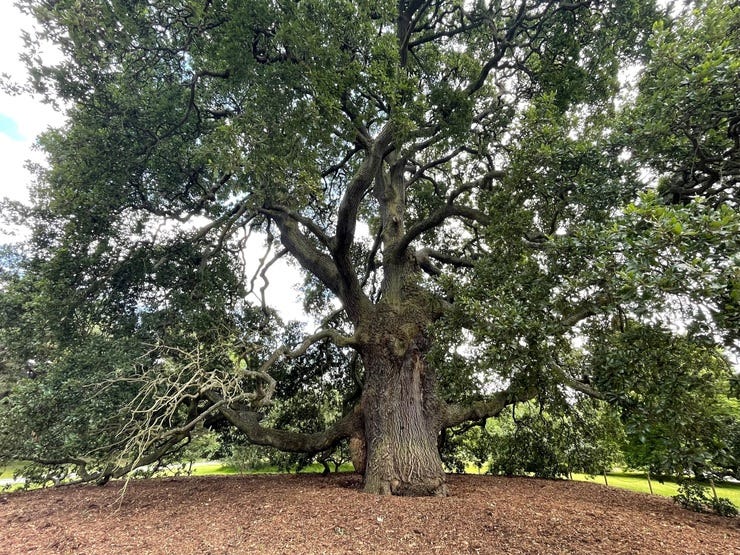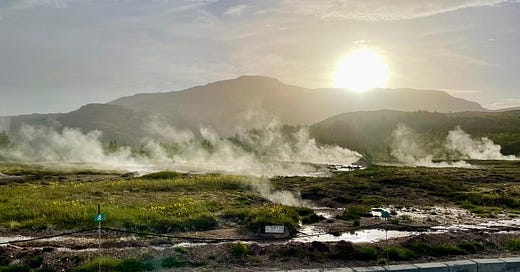Refugia Newsletter #17 by Debra Rienstra: a can-we-do-it study, an update on electrification, some UK rewilding efforts, and climate-awareness spotting in the UK
Refugia News
I'm still on the road, writing today from Grange-over-Sands, England. Ron and I have friends who live in this quiet resort town on Morecambe Bay, and we're enjoying time with them before heading on to Scotland and then to an academic conference in Cambridge. Listening to birds and walking about the country are a welcome respite after a five-day stay in busy London. Next stop: Dundee, Scotland. More on our UK travels in a moment.
Meanwhile, two generous reviews of Refugia Faith appeared in the last two weeks, one by Liuan Huska in The Christian Century and one by Steve Bouma-Prediger in The Reformed Journal. I am of course grateful for positive reviews of my own book, but I'm also grateful for everyone who writes and publishes thoughtful book reviews in general. Book reviews are a public service, and writing them takes a great deal of time and skill--it's an art form all its own.
Also, in upcoming event news, I warmly invite you to join us for a Creation Justice Ministries webinar, in which I will be presenting on Refugia Faith and enjoying some conversation with Avery Lamb, co-executive director of CJM. (We may have some special guests, too.) In newsletter #15, I featured the good people at CJM in the "Sightings" section. More information and a registration link below.
This Week in Climate News
Can we even do it? That's the question those of us worried about the climate crisis find ourselves thinking about while we lie awake on any given night. There are lots of versions of that question, but here's one: Is it even technologically and logistically possible for the US to make good on our pledge to cut greenhouse gas emissions in half by 2030?
Well, the answer is yes. At least according to a recent study that appeared in the peer-reviewed journal Science. (Here's the link to the study, but you need academic library credentials to get access.) Kristoffer Teague of Inside Climate News helpfully summarizes the study in a recent article. The study, he writes, concludes that "it is both technically feasible and financially beneficial for the U.S. to rapidly transition to clean power sources and electric vehicles."
The study models out six scenarios and emphasizes the need to work on clean energy generation and transportation as top priorities. Specifically, by 2030, we need to reach 80% renewable energy generation and increase from 3% EVs to 50%.
Yes, we need political will to do this. The study emphasizes the importance of policy changes that encourage transition--or at least do not get in the way. But that "financially feasible" part is crucial, and the cost modeling in the study brings good news: transition is financially beneficial, not only for consumers but even for utilities and "energy providers."
Whether the US reaches our pledged goals matters greatly, not only because we're a big generator of greenhouse gases, but also because our global influence makes it either harder or easier for other nations to comply with their pledges.
(Here's another summary of the study, too.)
Deeper Dive
All right then, how is the US doing on electrification and EVs? Well, we are on our way. The challenge now, as they say, is speed and scale.
According to the nonprofit, independent thinktank Ember, solar and wind now supply 10% of the global energy supply. All together, renewable energy sources supply 38% of the world's energy needs.
In the US, according to the US Energy Information Administration, we generate about 61% of our energy from fossil fuels, 19% from nuclear, and 20% from renewable. We've got a long way to go.
But things are moving quickly. Iulia Gheorghiu in Utility Dive notes "planned deployments for 21.5 GW of solar and 7.6 GW of wind in the U.S. in 2022, based on surveys of developers through October 2021. For utility-scale solar, that would surpass the estimated 15.5 GW of solar additions in 2021."
President Biden recently removed one barrier to solar expansion by suspending tariffs on solar panels while an ongoing investigation continues about tariff compliance. Using the Defense Production Act to suspend tariffs was a controversial move that not everyone agrees was wise, but the idea was to keep solar installations moving ahead quickly in the US. (This is a complex story I admit I don't entirely understand!)
Battery technology continues to race forward, with advances in solid state technology that avoids use of lithium-ion (problematic because of exploitative mining practices).
And US carmakers continue to tout their EV ambitions. GM has introduced their "Ultium" battery technology (quite the branding there, eh?). Here's a quick dive into US sales, which doubled in 2021 and are projected to continue rising sharply. (Whew! I'm bleary from trying to process all the stats about EV auto sales.)
Some other nations, not surprisingly, are working even more quickly toward energy transition. As part of the push toward energy independence in response to Russia's invasion of Ukraine, for example, the EU is now making solar panels mandatory on all new buildings.
That's enough deep-diving for now. Maybe someday I'll do a "climate champions" thing and examine some countries who are moving quickly and well toward renewable and energy independence. For now, let's turn briefly to the UK.
Refugia Sighting
I remember while living in London in 2004, I got caught up in watching documentaries on the history of gardening, and I thought: "What is happening to me??!" I was catching the fever, I guess, because the English do love their gardens. And Brits of all sorts are rightly fond of their striking landscapes.
So I'm pleased to read about new "nature recovery schemes" that involve the government paying farmers to rewild their land. This is a potentially win-win response to the stressed economics of farming and sheep-raising in Britain.
Here's a more extensive look at rewilding projects in Britain, written by Jon Sharman in The Independent. Some of the schemes involve re-introducing bison and pigs into woodlands as strategic disturbers or oysters into seabeds as "ecosystem engineers." As always, these refugia conservation projects have to be intensely local and based on extensive scientific understanding of the ecosystem.
Just Now Machine
Rather than doing the Wayback Machine feature this week, I'll share some quick climate awareness spottings from our travels so far in the UK.
You know climate awareness has gone mainstream when Heathrow Airport, of all places, has a Net Zero Plan and a public campaign to go with it.
At Kew Gardens, the magnificent botanical gardens and research center on the outskirts of London, we noted climate awareness in just about every exhibit. Kew specializes in rare species from all over the world, so they are not afraid to point out how destructive human habits threaten our world's flora: "This plant is now endangered due to deforestation..." appears on a distressing number of placards.
At the moment, Kew is featuring a major exhibit on current and future threats to global food production. How will we feed ourselves when climate change threatens our crops and food systems? The exhibits were informative, frank, serious, but also creative and sometimes even playful--as with the pair of gigantic troll sculptures reminding us not to waste food.
Join us at Kew Gardens for a summer of art exploring the future of food.


Thank You!
Thanks for reading! I keep these newsletters quickly scannable, with opportunities for deeper reading as you are able. I also tend to emphasize the connections between faith communities and climate action.
You can send me a response to this newsletter simply by replying to the email that brought it to you. If you are so inclined, please follow me on Twitter or Facebook @debrakrienstra. You can always contact me on those platforms, too. Also check out my website at debrarienstra.com.
If you like this newsletter, please share with others!








